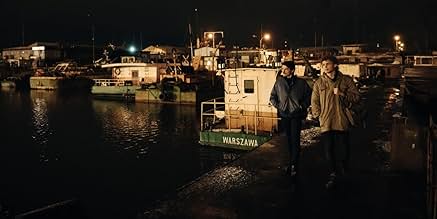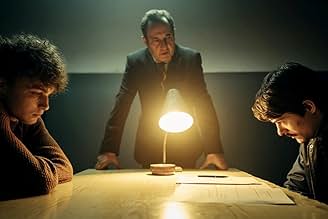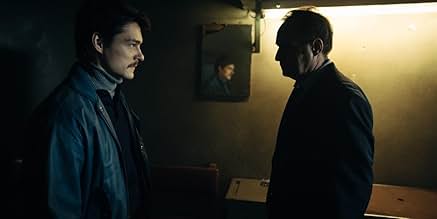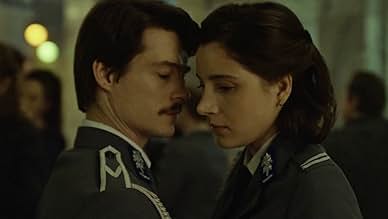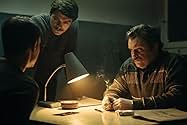VALUTAZIONE IMDb
6,8/10
4552
LA TUA VALUTAZIONE
Polonia, 1985. Non soddisfatto del risultato di un'indagine per omicidio, un giovane ufficiale della Varsavia comunista si mette in proprio alla scoperta della verità.Polonia, 1985. Non soddisfatto del risultato di un'indagine per omicidio, un giovane ufficiale della Varsavia comunista si mette in proprio alla scoperta della verità.Polonia, 1985. Non soddisfatto del risultato di un'indagine per omicidio, un giovane ufficiale della Varsavia comunista si mette in proprio alla scoperta della verità.
- Premi
- 4 vittorie e 2 candidature
Trama
Lo sapevi?
- Colonne sonoreVoyage
by Brian Bennett
Recensione in evidenza
Summary
What appeared to be a Polish version of Cruising at the beginning is definitely not. It is a successful neo noir, controversial due to its subject matter for a Polish fiction, which recounts a police investigation into a period during which thousands of homosexuals and heterosexuals related to them were persecuted, mistreated, booked and sometimes compulsively detained. This is another of those films that strongly recreates that oppressive period climate, but also everyday "behind the iron curtain".
Review:
During the 1980s, while the Polish police and secret service carried out Operation or Action Jacinto, the young detective Robert (Tomasz Zietek, with an air of Polish Alain Delon) faces the investigation, as an undercover agent, of a murder in the underground gay community in Warsaw. Despite the rapid "solving" of the case under pressure from the SB (Polish intelligence and secret police, in which his own father is a colonel), Robert insists on carrying out the investigation and will do so for more than one reason.
What appeared to be a Polish version of Cruising at the beginning, is definitely not. Piotr Domalewski's film is a neo noir in which Robert's research poses challenges to the system that are later enhanced by more personal ones that are added. It is controversial for a Polish fiction to relate a police investigation referring to a period during which thousands of homosexuals were registered in a compulsive way from raids in a framework of denunciation so expensive to Stalinism and police brutality and that gave rise to all kinds of extortion. In other words, Operation Jacinto appears as the background of the investigation and not as the plot axis of the film. Perhaps for this reason, his denunciation is more powerful since he paints a whole period painting.
This is another of those films that strongly recreates that period climate "behind the iron curtain." The staging uses a photograph and a successful eighties soundtrack and the police and personal intrigues of the detective (although they contain some predictable elements) are very well concocted and carried out, supported by the acting solvency to which we are accustomed to Polish fictions.
What appeared to be a Polish version of Cruising at the beginning is definitely not. It is a successful neo noir, controversial due to its subject matter for a Polish fiction, which recounts a police investigation into a period during which thousands of homosexuals and heterosexuals related to them were persecuted, mistreated, booked and sometimes compulsively detained. This is another of those films that strongly recreates that oppressive period climate, but also everyday "behind the iron curtain".
Review:
During the 1980s, while the Polish police and secret service carried out Operation or Action Jacinto, the young detective Robert (Tomasz Zietek, with an air of Polish Alain Delon) faces the investigation, as an undercover agent, of a murder in the underground gay community in Warsaw. Despite the rapid "solving" of the case under pressure from the SB (Polish intelligence and secret police, in which his own father is a colonel), Robert insists on carrying out the investigation and will do so for more than one reason.
What appeared to be a Polish version of Cruising at the beginning, is definitely not. Piotr Domalewski's film is a neo noir in which Robert's research poses challenges to the system that are later enhanced by more personal ones that are added. It is controversial for a Polish fiction to relate a police investigation referring to a period during which thousands of homosexuals were registered in a compulsive way from raids in a framework of denunciation so expensive to Stalinism and police brutality and that gave rise to all kinds of extortion. In other words, Operation Jacinto appears as the background of the investigation and not as the plot axis of the film. Perhaps for this reason, his denunciation is more powerful since he paints a whole period painting.
This is another of those films that strongly recreates that period climate "behind the iron curtain." The staging uses a photograph and a successful eighties soundtrack and the police and personal intrigues of the detective (although they contain some predictable elements) are very well concocted and carried out, supported by the acting solvency to which we are accustomed to Polish fictions.
I più visti
Accedi per valutare e creare un elenco di titoli salvati per ottenere consigli personalizzati
- How long is Operation Hyacinth?Powered by Alexa
Dettagli
- Tempo di esecuzione1 ora 52 minuti
- Colore
- Mix di suoni
- Proporzioni
- 2.35 : 1
Contribuisci a questa pagina
Suggerisci una modifica o aggiungi i contenuti mancanti

Divario superiore
What is the Canadian French language plot outline for Operation Hyacinth (2021)?
Rispondi

